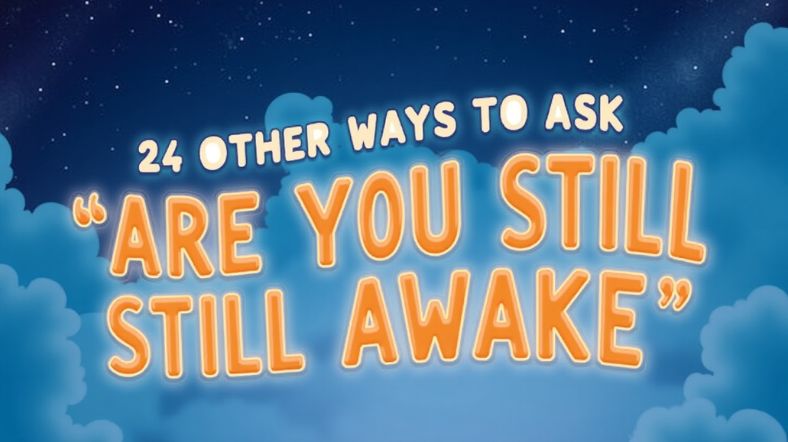In both casual and professional settings, asking if someone is still awake can be a delicate inquiry, especially if you’re reaching out late at night.
Whether you’re checking in with a friend, sending a quick email to a colleague, or wondering if someone is still available for a chat, it’s good to have a variety of ways to ask this question.
This article will explore 24 alternative phrases to ask “Are you still awake?” with a blend of fun, politeness, and professionalism, tailored to different situations.
I Hope I Haven’t Contacted You Too Late
This phrase is a gentle way of expressing concern about the time of your message. It’s polite and considerate, often used in professional or semi-formal contexts.
Example:
You might use this when texting a colleague about an urgent matter, wanting to show that you understand the importance of timing.
Emotional Impact: It conveys empathy and avoids coming off as intrusive.
Have You Gone to Bed Yet?
A simple, friendly, and slightly casual phrase, this works well with friends, family, or acquaintances. It gives a feeling of casualness while still being polite.
Example:
“Hey, have you gone to bed yet? I wanted to talk about something quickly.”
Emotional Impact: This phrase is light-hearted, yet it shows interest without being overly formal.
Still Burning the Midnight Oil?
This phrase is more playful and figurative, often used to ask if someone is still working late. It implies that the person might be engaged in a task that requires them to stay up.
Example:
A colleague working on a deadline might appreciate this more than a random check-in.
Emotional Impact: It adds an element of encouragement, making it feel less like an interrogation and more like a friendly nudge.
Are You Still Online?
In today’s digital world, many people are connected at all hours. This phrase works best when you’re reaching out to someone for a quick chat or to ask a question.
Example:
“Are you still online? I have a quick question about the project.”
Emotional Impact: It is neutral and efficient, suitable for both casual and professional interactions.
Is Bedtime Still in the Distance?
This phrase is a more poetic and playful way to ask if someone is still awake. It’s informal and creative, best used with friends or close colleagues.
Example:
“Is bedtime still in the distance, or have you called it a night yet?”
Emotional Impact: It’s a fun, whimsical way of asking that adds some personality to your message.
Have You Retired for the Night?
A slightly more formal and respectful way of inquiring if someone has gone to bed. It’s especially appropriate in professional or polite contexts.
Example:
“Good evening, have you retired for the night, or are you still available to chat?”
Emotional Impact: It conveys respect and formality while still getting to the point.
Are You Catching Some Z’s?
This phrase is fun and lighthearted. It’s best used with friends or people you have an easy-going relationship with.
Example:
“Hey, are you catching some Z’s, or is it still too early for that?”
Emotional Impact: This one adds a playful touch, creating a relaxed atmosphere.
Are You Still Up?
Short, simple, and casual, this phrase can be used in both informal and professional settings. It’s friendly and direct without being too forward.
Example:
“Are you still up? I have a quick question.”
Emotional Impact: It conveys curiosity in a non-invasive way, perfect for both work-related and personal inquiries.
Have You Hit the Hay?
Another casual and somewhat humorous phrase, “hitting the hay” refers to going to bed. It’s an ideal way to ask in relaxed, informal conversations.
Example:
“Have you hit the hay already, or are you still going strong?”
Emotional Impact: The phrase carries a relaxed vibe, showing a more approachable tone.
Can’t Sleep Yet?
This phrase is slightly more concerned than the others, suggesting you’re asking because the person might be awake for a reason, such as insomnia or stress.
Example:
“Can’t sleep yet? I know how that feels.”
Emotional Impact: It shows understanding and empathy, making it a great way to connect when someone might be having a restless night.
Are You Snoozing Yet?
“Are you snoozing yet?” is fun, friendly, and light-hearted. It’s a great choice for friends or colleagues with whom you share a casual tone.
Example:
“Are you snoozing yet, or are you still up working?”
Emotional Impact: This phrase is playful and warm, showing that you’re thinking of the person in a light-hearted way.
Still Wide Awake?
A more direct, but still casual, way of asking if someone is still awake. It implies that the person is either staying up late or working hard.
Example:
“Still wide awake at this hour?”
Emotional Impact: It creates a sense of camaraderie, acknowledging that staying up late might be a shared experience.
Are You Still Awake?
This is the most straightforward and neutral way to ask someone if they are awake, ideal for both casual and formal situations. It’s simple, polite, and gets straight to the point.
Example:
You might send this text to a friend late at night.
Emotional Impact: It’s friendly, non-intrusive, and works well in most settings.
Are U Still Awake?
This is a more casual, text-message-friendly variation. It uses shorthand (“U” instead of “you”) commonly seen in texting or online chats.
Example:
“Hey, are u still awake?”
Emotional Impact: It’s informal, light-hearted, and often used between close friends or when you want to keep things casual.
Why Are You Still Up?
This version of the question implies that you’re curious about why the person is still awake, often used when someone is staying up unusually late.
Example:
“Why are you still up? Got an interesting project going on?”
Emotional Impact: This phrasing can come across as caring or concerned, especially if the person’s late-night activities are out of the ordinary.
Are You Still Awake Meaning?
This phrase can be used in a context where you’re clarifying or asking for an explanation about someone’s level of wakefulness, perhaps in a more philosophical or light-hearted manner.
Example:
“Are you still awake meaning are you physically up, or is your mind still active?”
Emotional Impact: This question adds a layer of curiosity, showing interest in the person’s situation beyond just the physical act of being awake.
You’re Still Awake?
This expression can be used when you’re surprised that someone is still awake. It’s more of a statement than a question, showing both curiosity and perhaps a bit of admiration for their stamina.
Example:
“You’re still awake? I thought you’d be asleep by now!”
Emotional Impact: This phrase can sound both admiring and informal, perfect for friends who tend to sleep early.
Are You Still Awake Text?
This phrase refers to the context of texting someone to check if they’re still awake. It’s straightforward and directly linked to modern communication methods.
Example:
“Just sending this to check, are you still awake?”
Emotional Impact: It’s a casual, friendly way to follow up on a message or check in before making a request.
Are You Still Awake in Tagalog?
In Filipino, you can ask, “Gising ka pa ba?” which translates to “Are you still awake?” This phrase is commonly used in conversations where you want to inquire about someone’s alertness or presence.
Example:
“Hi, gising ka pa ba? May gusto akong itanong.” (Hi, are you still awake? I have something I want to ask.)
Emotional Impact: It carries a warm, familiar tone and is great for informal settings with friends or family.
Are You Still Awake Answer?
This is a request for a response to the question, essentially asking for confirmation that the person is still awake.
Example:
“Are you still awake? I need to ask something quick.”
Emotional Impact: It’s a direct and clear way to prompt a response, especially when you need an immediate answer.
Are You Still Awake Meaning from a Guy?
When a guy asks this question, it may carry a slightly different emotional weight, depending on the context. It could be interpreted as a genuine check-in, or as a way of starting a conversation.
Example:
“Hey, are you still awake? Thought I’d see if you wanted to chat.”
Emotional Impact: If coming from a romantic interest, it could feel flirty or affectionate, adding warmth to the interaction.
Why Are You Still Awake Synonym?
This asks for a rephrasing or variation of the “still awake” question, offering a different way to phrase it. Some examples include “Why aren’t you asleep?” or “Still up late?”
Example:
“Why aren’t you asleep yet? Everything okay?”
Emotional Impact: These synonyms convey concern and curiosity, depending on the tone of voice or context.
Are You Still Awake Meaning?
This is simply asking for clarification or offering the phrase in a deeper context, often in relation to whether someone is still mentally alert or just physically awake.
Example:
“Are you still awake meaning? Do you have the energy to chat?”
Emotional Impact: This phrase could feel more reflective, asking about the person’s mental state rather than just their physical wakefulness.
Are You Still Awake or Are You Still Up?
This is a slight variation of the original question, with “still up” offering an alternative phrasing. It can be used casually when you’re unsure if the person is still working, socializing, or simply not asleep.
Example:
“Are you still awake, or are you still up?”
Emotional Impact: It sounds friendly and relaxed, offering two options while maintaining a sense of curiosity and care.
Conclusion
Using different ways to ask “Are you still awake?” can make your communication feel more personalized, warm, and considerate.
Whether you need to send a professional email or have a casual conversation with a friend, having a variety of phrases at your disposal will ensure that your message feels fresh and relevant.
The key is to choose a phrase that matches the context and your relationship with the person, adding a touch of personality and empathy to your inquiry.
Don’t hesitate to experiment with these alternatives you might just find a new favorite phrase to use next time!

Mark Tony is a grammar expert with 5 years of experience, specializing in teaching English grammar, enhancing writing, reading, and speaking skills for diverse learners.









